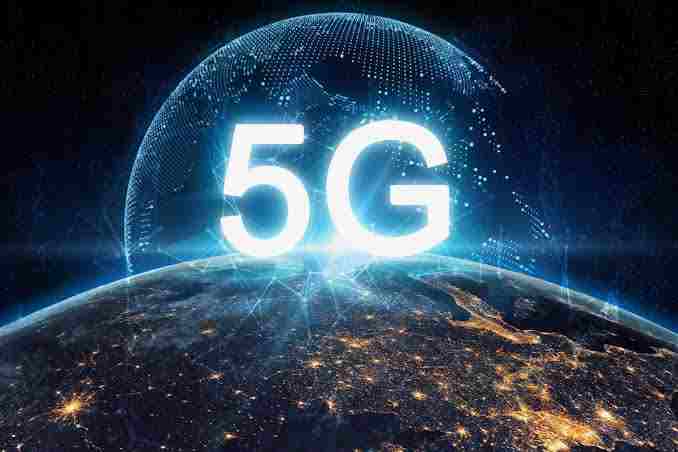What Is 5G Technology ?
5G technology is the fifth generation of wireless communication, and it’s a game-changer. Imagine your current internet speed, now multiply it several times over – that’s what 5G offers. At its core, 5G is all about speed, low latency, and massive connectivity.
Speed is the star of the show. With 5G, downloading movies will take seconds, not minutes. You can stream 4K videos without a hiccup, and online gaming becomes incredibly smooth. It’s a digital paradise for speed enthusiasts.
Low latency is another key feature. This means there’s almost no delay when you send a request and receive a response. It’s crucial for things like remote surgery, autonomous vehicles, and augmented reality experiences. 5G makes these applications not only possible but practical.
Massive connectivity is 5G’s superpower. It can connect an incredibly large number of devices simultaneously. This is perfect for the Internet of Things (IoT), where everything from your fridge to your car can communicate with each other in real-time.
In a nutshell, 5G is all about making our digital lives faster, more responsive, and interconnected. It’s not just an upgrade; it’s a technological leap that will reshape how we live, work, and play.
Why Is 5g Important to Us ?
5G is important to us for several reasons! Imagine it as a supercharged version of the internet. Here’s why it matters:
1. Faster Speeds:
5G is incredibly fast, like downloading a movie in seconds. This means quicker loading times for websites, smoother video calls, and faster downloads of apps and files.
2. Lower Latency:
It reduces the delay in data transfer, making things like online gaming and remote surgery more reliable and responsive.
3. More Connections:
5G can connect many more devices at once, which is essential as we use more smart gadgets like phones, cars, and home appliances.
4. Innovation:
It opens the door to new technologies like autonomous vehicles, smart cities, and augmented reality, which can improve our lives and the way we work.
5. Economic Growth:
5G can boost economies by creating jobs and supporting industries like healthcare, entertainment, and manufacturing.
In simple terms, 5G makes everything faster, more reliable, and enables exciting new possibilities for our future!
Why Is 5g banned in Some Countries ?
5G is not universally banned in countries, but there have been concerns and debates surrounding its deployment in some regions for various reasons. Here are a few key factors that have led to restrictions or bans in certain places:
1. Health Concerns
Health concerns related to 5g technology primarily revolve around the EM radiation it emits, specially the Radio Frequency (RF) spectrum. Some individuals and groups worry that the increase use of 5g wireless networks could have adverse effects on human health.
The main concern stems from the higher frequency bands used in 5G, including millimeter waves. Critics argue that these higher frequencies may penetrate the human body more superficially but at higher intensities, potentially causing tissue damage or health problems. However, it’s essential to clarify that scientific consensus has not established a clear link between 5G and adverse health effects.
You can also read : Ganesha color prediction formula and trick
Numerous studies and extensive research have been conducted to assess the safety of RF radiation, including 5G. Regulatory bodies like the World Health Organization (WHO) and the U.S. Federal Communications Commission (FCC) have set safety guidelines that 5G technology must adhere to, with radiation levels well below the threshold for harmful effects.
While some people remain cautious due to the “precautionary principle,” which suggests taking preventive measures in the absence of conclusive evidence, the consensus in the scientific and regulatory communities is that 5G, when deployed within established safety limits, is not inherently harmful to human health. Nevertheless, ongoing research and monitoring continue to address any potential long-term health implications associated with 5G technology.
2. National Security
National security concerns regarding 5G technology primarily revolve around the potential vulnerabilities and risks associated with the deployment of foreign-made 5G infrastructure, particularly from countries that may not be trusted or are viewed as geopolitical adversaries. Here’s an expanded explanation of this issue:
Cybersecurity Risks
One of the major concerns is the susceptibility of 5G networks and equipment to cyberattacks. If a significant portion of a country’s critical infrastructure, such as communication networks, relies on foreign-made 5G technology, it could be vulnerable to espionage, data breaches, or disruption by hostile actors. This poses a substantial national security risk.
Data Privacy
5G networks are expected to handle vast amounts of sensitive data, including government communications, critical infrastructure control, and personal information. Allowing foreign entities access to this data through 5G infrastructure could compromise national security and citizens’ privacy.
Supply Chain Dependencies
Dependence on foreign suppliers for 5G infrastructure components may raise concerns about the reliability of the supply chain, especially during geopolitical tensions. Disruptions in the supply chain could impact a country’s ability to maintain and secure its 5G networks.
Backdoor Access
Worries persist about the potential for hidden backdoors or vulnerabilities intentionally inserted into 5G equipment by foreign manufacturers. Such vulnerabilities could be exploited for espionage or cyberattacks.
To address these concerns, some countries have opted to restrict or ban the use of specific vendors’ equipment in critical infrastructure or have implemented stringent security and testing standards for 5G technology. These measures aim to balance the benefits of 5G technology with the imperative to safeguard national security interests. The national security debate surrounding 5G reflects the evolving landscape of technology, geopolitics, and the need for robust cybersecurity measures.
3. Environmental Concerns:
Environmental impact assessments may lead to restrictions in certain areas where the installation of 5G infrastructure could harm ecosystems or wildlife habitats. We will discuss the topic in a separate topic in details.
4. Technical Challenges:
Technical challenges in the deployment of 5G technology encompass a range of complex issues that can affect its rollout and effectiveness. These challenges include:
Spectrum Allocation
5G requires a substantial amount of radio spectrum, and securing the necessary frequency bands for its operation can be a regulatory hurdle. Coordinating spectrum allocation and usage with existing services like 4G and broadcasting is a delicate balancing act.
Infrastructure Upgrades
Implementing 5G often necessitates extensive upgrades to existing infrastructure, including cell towers and network backhaul. This requires significant investments in both time and resources.
Interference and Coverage
High-frequency 5G signals have limited propagation range and can be easily blocked by obstacles like buildings and trees. Ensuring consistent coverage and mitigating interference issues in urban and rural areas pose technical challenges.
Device Compatibility
Older devices may not be compatible with 5G networks, requiring users to upgrade their devices to take advantage of the technology.
Network Densification
Achieving the promised high data speeds and low latency in 5G often requires deploying more small cell sites in densely populated areas, which presents logistical and regulatory challenges.
Addressing these technical challenges demands careful planning, investment, and collaboration among industry stakeholders and regulatory bodies to ensure that 5G can deliver its promised benefits effectively and to the widest possible audience.
5. Regulatory and Political Factors
Political or regulatory considerations can also play a role in 5G deployment decisions. Governments may have different priorities and approaches to telecommunications policy, leading to variations in the adoption of 5G technology.
5g Effect On Environment
We are in the era of ever-advancing technology, 5G has emerged as a transformative force in the realm of wireless communication. While its speed and connectivity enhancements are widely celebrated, it’s crucial to examine the environmental impact of 5G technology, a topic gaining increasing attention.
### Energy Efficiency:
One of the positive aspects of 5G is its improved energy efficiency compared to previous generations. 5G infrastructure is designed to be more power-efficient, with smaller base stations and advanced technologies like beamforming. These innovations reduce energy consumption, which can contribute to a lower carbon footprint compared to older networks.
### Reduced E-Waste:
The increased longevity of 5G devices is another eco-friendly aspect. With 5G’s capabilities, devices are expected to remain relevant for a more extended period, reducing the need for frequent upgrades and the associated electronic waste generation.
### Smart Cities and Sustainability:
5G plays a vital role in enabling the development of smart cities. These cities leverage 5G to optimize resource usage, reduce energy consumption, and improve transportation systems. For instance, smart traffic management systems can reduce congestion and emissions, positively impacting the environment.
### Challenges to Consider:
However, it’s essential to acknowledge some environmental concerns associated with 5G:
Increased Energy Consumption
The deployment of more base stations and data centers to support 5G networks may lead to increased energy consumption if not managed efficiently.
Manufacturing Impact
The production of 5G infrastructure and devices can have a significant environmental footprint, particularly if not produced sustainably.
E-Waste Management
While 5G devices may have a longer lifespan, the rapid pace of technological advancements can still contribute to electronic waste concerns.
This, 5G technology presents a mixed bag in terms of its environmental impact. On one hand, it offers opportunities for energy efficiency, reduced e-waste, and the development of sustainable smart cities. On the other hand, it poses challenges related to increased energy consumption during deployment and the environmental impact of manufacturing.
To harness the positive environmental potential of 5G fully, it’s crucial for industry stakeholders, governments, and consumers to collaborate. Sustainable manufacturing practices, energy-efficient deployment, and responsible e-waste management are essential aspects of mitigating the environmental impact of this transformative technology. As 5G continues to roll out globally, striking a balance between technological progress and environmental responsibility will be key to ensuring a greener digital future.
5g effects on birds and bees
There is still no scientific proof to suggest that 5G technology directly and significantly impacts birds or bees. The concerns regarding the potential effects of 5G on these species are largely based on misinformation and misunderstandings of wireless technology.
Birds
There is no credible scientific research demonstrating that 5G technology harms birds. Birds have coexisted with various forms of electromagnetic radiation for decades, including from radio and television broadcasts, without widespread negative effects on their populations.
Bees
Concerns about bees and wireless technology have often centered around colony collapse disorder (CCD), a phenomenon linked to multiple factors, including pesticides, habitat loss, and climate change. While some studies have explored whether electromagnetic radiation plays a role in CCD, the scientific consensus remains inconclusive, and more research is needed.
It’s important to note that regulatory bodies and health organizations, such as the World Health Organization (WHO) and the Federal Communications Commission (FCC), have established safety guidelines for electromagnetic radiation exposure, including that from 5G technology. These guidelines are designed to protect both human health and the environment.
However, ongoing research continues to examine the potential impacts of electromagnetic radiation on wildlife and the environment. It’s crucial to rely on peer-reviewed scientific studies and expert consensus when evaluating the effects of technology on the natural world and to be cautious about spreading unfounded claims or misinformation.
Is 5g Harmful For Humans ?
Numerous studies have been conducted to assess the potential health effects of electromagnetic radiation, including the radiofrequency (RF) signals used in wireless communication, including 5G. The consensus among health organizations like the World Health Organization (WHO) and regulatory agencies like the Federal Communications Commission (FCC) is that, when adhering to these established safety guidelines, the levels of RF radiation from 5G are not known to cause harm to human health.
Conclusion
5G technology represents a remarkable leap forward in wireless communication, promising faster speeds, lower latency, and a myriad of transformative applications. While concerns have been raised regarding its potential impacts on health and the environment, the weight of scientific evidence and regulatory oversight indicates that, when deployed within established safety guidelines, 5G is not inherently harmful to humans or the environment.
5G’s potential positive contributions to society are substantial. It enables the development of smart cities, enhances resource efficiency, and supports innovative technologies. Moreover, it offers the opportunity for a more connected and data-driven world.
However, responsible deployment practices are critical. Industry stakeholders, governments, and communities must work together to ensure that 5G infrastructure adheres to energy-efficient standards, sustainable manufacturing, and responsible e-waste management. By doing so, we can harness the transformative power of 5G while safeguarding both human well-being and the environment.
As 5G continues to roll out globally, it is imperative to stay informed, rely on credible sources, and engage in ongoing research and dialogue to address any legitimate concerns and make informed decisions about this game-changing technology.




7 thoughts on “5g Effect On Environment And Human”